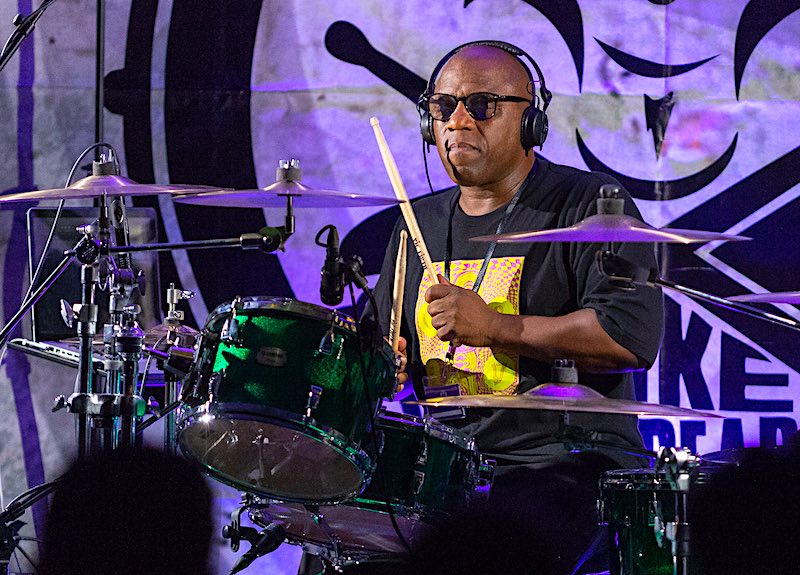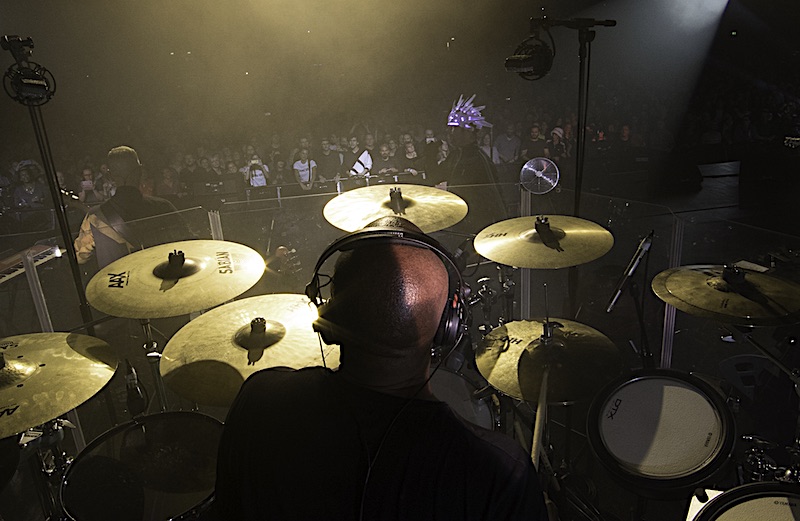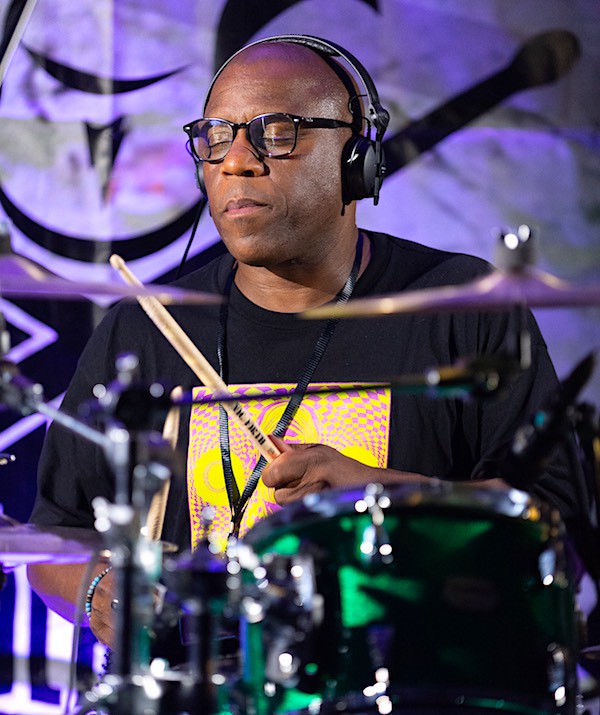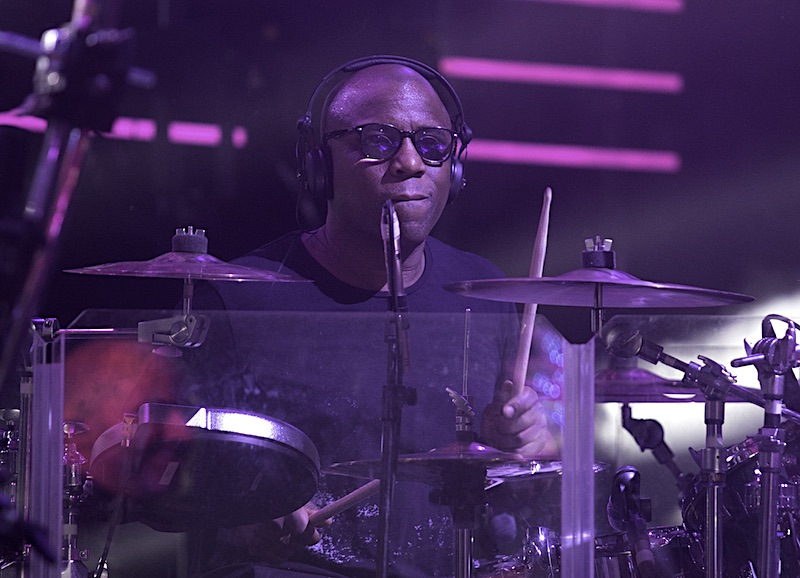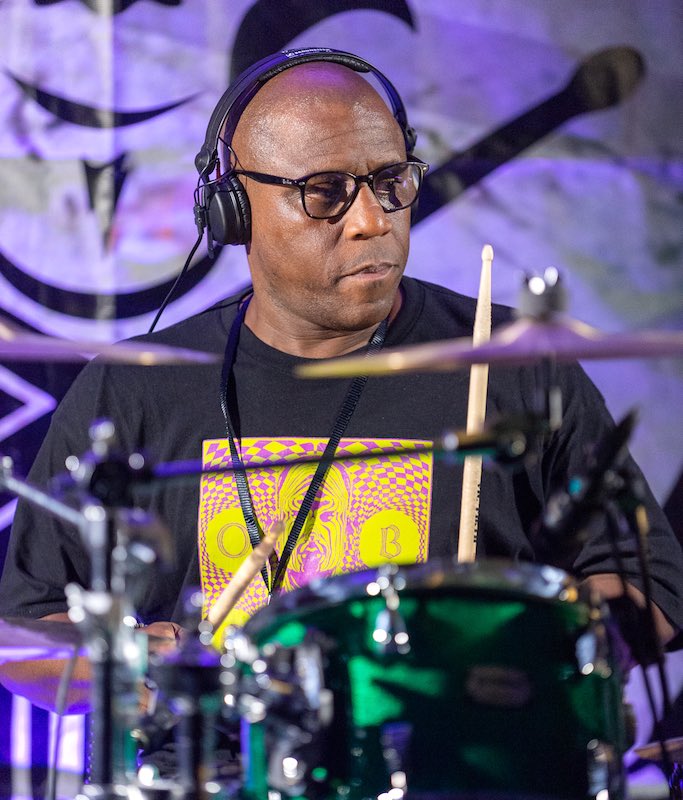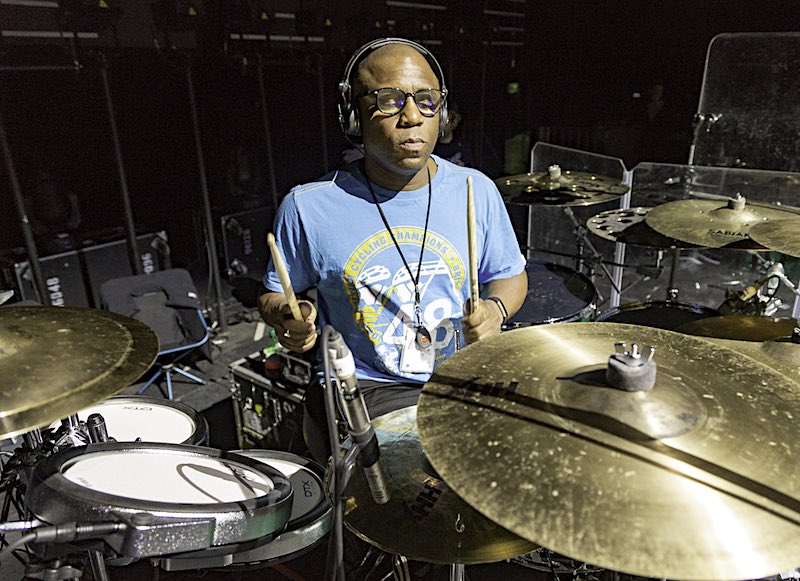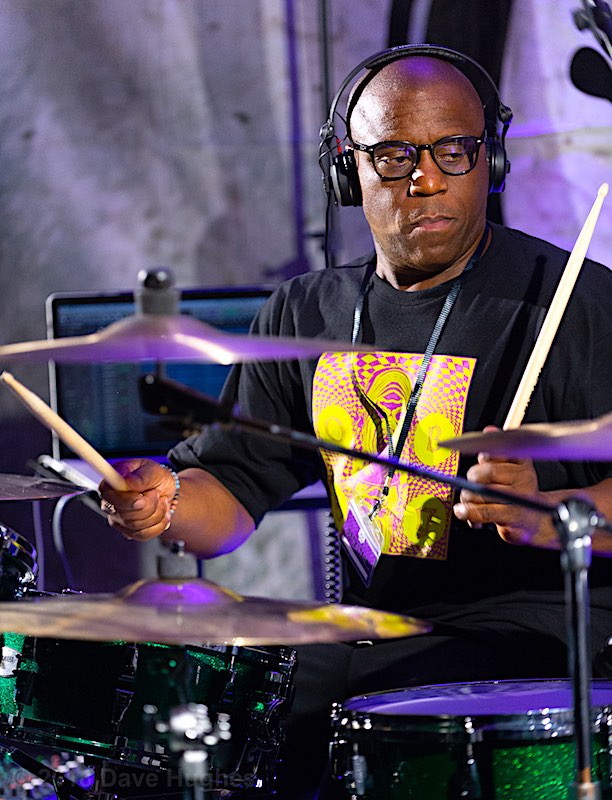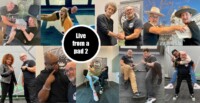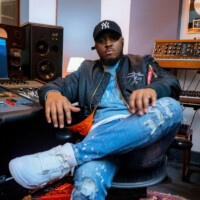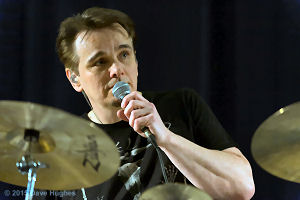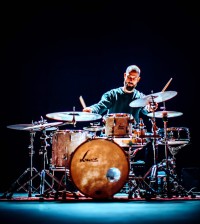Funk is all about tight drumming, and while many try, only a few really ever master it. One drummer at the very top of the funk game is UK’s very own Derrick McKenzie.
Born and bred in London, Derrick discovered his love for rhythm at a very young age and mainly taught himself by watching his favourite drummers. Soon after school he started touring with various bands. This not only taught him the ‘do’s and dont’s’ of professional gigging, refined his drumming skills and introduced him to electronics; but also revealed that the success of a band can quite often be down to band internal politics.
Nowadays Derrick is mainly known and loved as the drummer for Jamiroquai. Many see his driving grooves as a major part of the band and the fact that he is celebrating 25 years with the band this year speaks for itself.
I caught up with Derrick at the UK Drum Show to talk about his musical upbringing, his passion for dance music and his way onto the drum chair of the UK’s most successful jazz-funk band ever.
You started playing the drums at a very young age.
I picked up my first set of “sticks” at the age of six; actually it was a pair of wooden coat hangers. After listening to some rock track on the radio I just picked them up and started banging them on the floor. I just naturally fell into it and really enjoyed it.
When I was seven we moved from Islington to Tottenham and my new friends there decided to form a band. My mate Mario was actually the drummer of the band but we swapped around a lot. That was really my first experience playing the drums.
I wasn’t really seriously into drumming until I was maybe 13. My sister’s boyfriend at the time was a reggae keyboard player and heard me play along to some reggae tunes. He said: “You’re sounding really good. You should take it up seriously”. I didn’t really think anything of it though, I was just playing along to some music. Back then I used to play on this rectangular chair we had: the right knee would be the hi-hat, the seat of the chair would be the snare and the kick was just me stomping on the floor. It was a weird way to practise but it did the trick. He invited me to come to a rehearsal of his reggae band where I got on the drums and played along with them. The guys really enjoyed it and gave me nice feedback that kept me going.
A year later a friend of mine at school asked me to join her band ‘Pure and Simple’. She was already doing music from a young age. I joined them and we stayed together for about three years.
That was all while you were still at school?
Yes, it was during my teenage years. The band dispersed just after I went to college. Then I joined a jazz/funk band called ‘Transients’. We didn’t do many shows but we rehearsed really hard and wrote a lot of original compositions. That was great and it was sort of my first taste and experience of jazz/funk. At that point I thought I’d just have to take it a bit more seriously. I was about 17 at the time. All the years up till then I never had a drum kit because my mum refused to buy me one. When I turned 18 I was working at Marks and Spencer earning £9 for half a day, doing extra hours just to earn more money, to then buy my first drum kit: a 1964 Slingerland set, black sparkle, for £400.
Up till then you were completely self-taught?
Yes. It was after I bought my first drum kit that I had my first lesson with an American guy called Rusty who lived in Wembley. He was a great all-round drummer and taught me some good basics. Later I had lessons with Lloyd Ryan.
You naturally taught yourself to play left-handed, even though you would have watched most drummers play the other way around. Did that just happen?
Yeah, I’ve always played left-handed. It was just a natural thing and immediately felt right. I can’t explain it though, I just thought that’s the way to play.
I picked up technique just by watching my favourite drummers. Billy Cobham was one of my favourites when I was younger. I actually watched him play with the Mahavishnu Orchestra at one of those Old Grey Whistletest programs back in the day and he played open handed. It still never got me away from playing the left handed set up. What really got to me though was how easily he played his chops; so technique-wise I think I adapted a lot of his style and still have that in me. It was him, followed by Harvey Mason who’s another one of my main influences.
Funk, the style of music you’re probably most known for playing, is all about playing tight. That requires a lot of technique, doesn’t it?
Yes it does but you know what? I mainly acquired that through listening and playing along to thousands of my favourite records. Hence my style. If there was something I didn’t like, I just wouldn’t play it. I was always into that disco/funk thing and I sat down for hours trying to emulate what they were doing on the record. Later on I learned to play with the click.
When I was about 21 I joined a band called Candyland and they were using click tracks, computers, sequencers and all that kind of stuff. I used a Roland MC50 which I still have. In those days you had to put a sample into a sampler, assign it to a note and then repeat that note so many times in bar 1, repeat it again in bar 2 and so on. It took forever! Doing that and playing with those sequences actually made me nail playing so tight. With the loops and the click going in the background you’ve got to keep it tight. That’s what got me into that. I can still play without the click though and I really enjoy that too. There are actually some tracks with Jamiroquai that we don’t use a click for. Space Cowboy for example because there are fluctuations in the tempo. The way I gauge my tempos is by listening to Jay singing. By his speed and how relaxed he’s singing I know I’m at the right tempo.
Quite often I can hear you playing your kick slightly ahead of the backbeat which creates that unique ‘pushy’ feel to it. Has that just developed naturally over the years or is it something you specifically worked on?
You’re right in saying that. I think it’s something that I’ve developed over time. Jay likes to hear things on it but he still wants the overall feel of the whole track. The kick drum is always dead on the beat. On a track like ‘Give Hate A Chance’ for example the kick drum is on the beat, the snare drum is slightly laid back and the hi-hats are driving it. A lot of my beats are based around kick, snare and hats. Like that the drums feel very short, sharp and to the point. My drumming has been like that from day one. It’s never been about long fills; unless the music especially requires it. Outside of that keep it kick, snare, hats, short fills, straight in, straight out, batter the beat.
Was Candyland your first pro gig?
Back in 1986 or something like that, yes. I joined them while I was working for Marks & Spencer’s. I got that gig through an audition and the four of us pretty much went straight on to record our album ‘Suck it in C’ (the singers choice, bless him). We kind of did that 90’s Indie-Dance style which was my first real experience of playing with sequencers. I toured that with kick, snare, hats, one crash and an Octapad. That was it.
We toured it quite a bit in America and the UK but after the tour finished politics kicked in and it all fell apart. That was the end of that but it was actually a really good learning period playing with sequencers, learning about computers, operating the original MPC, the Roland MC 50 and all that technology stuff. The album was actually recorded using the MPC with a few added live bits, but of course I had to play the parts live. I still think that live drums just bring it more to life.
After Candyland you went on to join Freaky Realistic.
Oh crikey, now we’re talking! Yes! I was kind of in limbo for six months trying to find work, doing some sessions and getting my name out there when the manager of Candyland called me and told me there was this band looking for a drummer. That’s how I joined them. The dynamics in the band were really different but the songs were great. It actually did really well: it made it onto the radio, we did some TV shows, a bit of touring… but then again: band politics. I couldn’t believe it. Groundhog day. Just like that they split up and I went back to being unemployed.
That must have been frustrating. It didn’t put you off bands though.
No, that’s when I joined Urban Species. My mate Joss, who’s a bass player, told me that they were looking for a rhythm section so we went to audition. We got the gig and I was with them form 1990 – 1994. We went to Japan, toured Europe and the UK; it was a great time. They were an amazing band and really talented. The dynamics were great and we had such a good time on the road. I loved it.
Up till then all your work was ‘band-based’?
It just fell into place like that. My career has been band based from the start and because of that I always approached any job I did the same way. So even though something was just a session, I would take it as being in a band and working as a unit. Being part of a band (or at least having the band attitude) just works really well for me personally. It makes me get on with the people I’m working with a lot better and it makes them accept me more as well. It’s just a nicer approach than turning up, playing, getting your money and then running off. Especially if you’re gonna be touring with people it’s nicer to have these dynamics going on so you can enjoy your job fully.
So the audition for Jamiroquai came pretty much out of the blue?
Yes. I was just about to embark on another tour with Urban Species when I got a call from the publisher of Jamiroquai asking me to audition for the band. I think I had enough of the rap thing at that time so I agreed to it.
I didn’t know the band when I got the call. My friend gave me the album to listen to at which point I realised who they were and that I had actually heard the music on the radio. I turned up at the audition and played along with Toby, Stuart and Wallis. After about 45 minutes this guy comes in, stands at the back and just listens to us jamming. I thought it’d be just someone who works at the studio but in a break he comes up to me and introduces himself as Jay. I still didn’t clock that it was the lead singer; I was just listening to Toby who was leading the session. We started playing ‘When You Gonna Learn’ and this guy just starts to sing. That’s when the penny dropped. It was a really nice experience playing a tune with the whole band after having heard it on the radio.
When we finished the song Jay said: “Let’s try something different. Start a beat”. I was into drum’n’bass at the time so I started playing this hi-hat thing trying to merge it with funk in a beat. Toby started playing along and came up with a chord progression. Just like that, in that audition, we came up with the song ‘Just Another Story’. That was the first thing I’ve ever done with Jamiroquai and it actually became the first track on ‘Space Cowboy’. I’m quite proud of myself for that.
That was almost 25 years ago. It’s been an amazing time and it’s still busy. We’re just coming towards the end of the ‘Automaton’ tour which has gone really well and in all the time I’ve been with the band I actually think this touring period has been the best we’ve ever played as a band. Jay has been singing fantastically and it’s the most intensely I’ve ever played without being over the top. Everybody else has been playing exceptionally well too.
It’s quite a big band at the moment, isn’t it?
We’ve got Jay, three backing vocalists, drums, bass, guitar, keys ‘1’, keys ‘2’ and percussion – so there are 10 people on stage. That’s without the horn players. Jay usually either has BV’s or horns, never both. Oh, actually when we did the Nobel Peace Price we did have three horns and three BV’s, plus a 64 piece orchestra. That was a nice experience.
Talking about the whole electronic side of things earlier: are the many electronics involved in this gig for you now?
Yeah, we’re trying to embrace the whole electronic thing. Being into dance music as well I’m quite into samples and sounds. I’m always collecting sounds and actually gather most of them from a sound bank called ‘Samples from Mars’. It’s this guy in New York who takes these old machines, samples all the sounds and then puts them to tape. He does a really good job reproducing them. So all the samples I use either come from the original album source or I’ve taken them from my Samples from Mars library. I put them on my Yamaha DTXM12 or my DTX900 and I’m ready to go.
So you’re running it all on hardware rather than on a laptop?
Yes. I’m totally independent from the rest of the show. We do use Ableton to run loops and some vocal effect samples but the show doesn’t depend on it. So just in case Ableton shuts down, you wouldn’t miss it because it’s so minimal. I do get the click from Ableton but I have a backup one that my drum tech can change to in case.
Also nothing of it is connected to the lights or timecode. The lights are all run manually because you just never know what Jay is gonna do. He might want to repeat the verse or play another chorus. It’s nuts.
Sounds like a fun character to work with.
Jay doesn’t think like a normal singer would. He wants things out of the box. That’s what makes him extraordinary. He’s always thinking about what he could do differently. We could write a song, work on it for days and finish it all off and Jay just goes: “I don’t like it”. That means we’re starting from scratch. But that’s a good thing because it gets your brain going, keeps you on your toes and you do come up with something that’s actually better. Or you come up with something different that you can then use for another song. That’s something we do all the time.
But yeah, Jay is great to work with. He can be difficult – like everyone – but if he wasn’t difficult there would be a problem. He drives a hard ship and he has to, otherwise it would all go to pot. He’s the leader of the band and he’s the boss.
Are you mainly writing as a band?
The last album was just Jay [Kay, lead vocals ] and Matt [Johnson, keyboards]. In my personal view I think we write better as a band. It’s just nicer when we all go to the studio and everyone can get the feeling of the track from the beginning, we can work together as a unit, have a bit of a laugh and go to the pub. It really helps the camaraderie. The last album, although I really enjoyed playing it, it felt a bit more like I was doing a session. Being there from the beginning just gets your more involved in creating the beats rather than replacing drums that they programmed. I still try to adapt it to the way I would play it.
You’re still doing quite a bit of session work outside of Jamiroquai: Jessie J, Alex Clare, John Newman to name a few…
Yes. I work with a producer / songwriter called Steve Brooker. We’ve worked together a lot and he’s currently putting together a production team so I’m trying to get more involved.
Steve is a great guy to work with because he’s open to anything and everything. I program stuff for him and we change things around together. So in the process I’m learning how to use all this gear and he learns a lot about keyboards and my way of writing. It’s really enjoyable.
You also do quite a bit of dance music.
Yes, I’ve always been into that: from drum’n’bass to house music, funk, soul, soulful house, deep soulful house, tech house… from a beat perspective, you know. What I like about that is that not everybody in the band listens to this music. So me listening to it means I’m injecting it back into the band. Somebody else might bring a different influence and that’s what makes it sound different.
I’m currently working with two DJ producers: Steve Mac, who was the first superstar DJ in the 90s. He’s got this amazing studio in Brighton with a ‘who’s who’ of keyboards, drum machines and synths.
The second guy, Steve Taylor, and I just started a new disco-esque project. He’s into old school house, acid house and stuff like that. So you will have that influence in it with the new disco vibe. Get live bass on it, live drums and play the whole hybrid game. I also know some really cool vocalists that I’ve worked with and I’d love to have them sing on my tracks. I need to get begging. A couple of people have said yes already which is amazing.
On top of that I’ve been working with DJ producer Richard Earnshaw who is working in deep soulful house. He’s one of my main influences to be honest because he’s very musical. He’s taught me a hell of a lot about music so I have to big him up.
He actually also works on a project called ‘Spirit Chaser’, which is one of my favourite projects ever.
Are you touring the DJ act?
Yeah I’m gigging it quite a bit. I work with a production company called ‘iCulture’ which is run by Richard and Steve Taylor. They’ve both been working together for years and are basically going around the world playing at different venues. There is a roster of about ten DJs and it’s always a mix of people doing a gig together. I do gigs independently as well. After Jamiroquai shows for example. Rather than going to a bar and spend all your money, I go to a club and DJ. I really enjoy that. I’ve just gigged for two hours, have a shower, new clothes on, straight out the door with a USB stick and headphones – play. I really love it. It’s something I’ve always wanted to do and I want to work more on it next year.
Finally, what’s next?
I will working on more tracks with these guys for 2019. I am also going to be touring with an Italian artist called Emma Marrone with Paul Turner and I have DJ dates being organised in Europe for 2019 also. Together with Jamiroquai I am hoping to be busy as a bee. I am also looking forward to working with a singer from Zurich called Deniz Simon doing disco funk tracks too.
Thanks a lot for your time Derrick!
Interview by Tobias Miorin
January 2018


